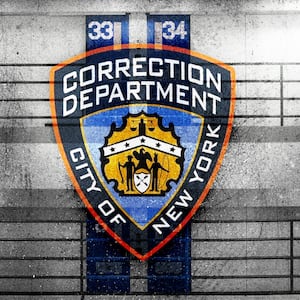Nearly five months at a dilapidated New York City island jail notorious for its frigidly cold cells and violent inmates are what await Allen Weisselberg, once the chief financial officer at former President Donald Trump’s corporate empire and now a convicted tax cheat.
On Tuesday in Manhattan criminal court, a state judge sentenced the wealthy 75-year-old to five months at Rikers, noting he was inclined to give Weisselberg an even stiffer sentence. He cited the way Weisselberg abused his position of authority at the Trump Organization to cook the books—and give his wife a no-show job just to let her qualify for taxpayer retirement benefits.
“It was driven purely by greed. Pure and simple. The entire case was driven by greed,” Justice Juan Merchan said. “At a time when so many Americans work so hard in the hopes of they’ll one day benefit from Social Security, your client found a way to give his wife a $6,000 payroll payment so that she could contribute to Social Security so that she could one day receive the benefits to which she was not entitled.”
Weisselberg, who was wearing a jacket and a pandemic cloth face mask, was led out of the courtroom in handcuffs. He had little to say, merely agreeing with what his lawyer said: that he had already been punished "severely" by being forced to pay $2.3 million in fines and facing "disgrace."
Weisselberg avoided what could have been a longer sentence when he struck a plea deal with New York County prosecutors and agreed to testify against the company, which was itself convicted of similar crimes in December. The company is set to be sentenced this Friday and punished with monetary fines.
As is standard procedure in New York, Weisselberg will only serve two-thirds of his actual five month sentence if he remains on good behavior, meaning he’ll likely serve less than four months in total.
But even if his sentence is cut short, every day he spends on Rikers Island will be its own sort of hell.
“Regardless of what you think of Weisselberg politically, spending 100 days at Rikers Island is going to be absolute misery,” warned attorney Eliza Orlins, a public defender whose clients routinely get shipped there. “People are suffering there. They’re not getting their medical appointments. They’re not getting food. They’re not getting clean, sanitary conditions. It’s horrible for every single person who has to go there.”
The conditions are so dire that human rights activists have been actively trying to close down the jail for years. And a detainee lawsuit that led to a landmark settlement with the city that placed a federal monitor in charge of improving the dire conditions there has amounted to nothing. Seven years and $18 million dollars later, the effort has come under scrutiny for its poor results—a shocking failure that led the news outlet Gothamist to assess that the “city jails system is actually far deadlier and more dangerous than it was.”
The problems for Weisselberg are expected to start as soon as he arrives on the island, a depressing and stark assortment of gray buildings on an island in the East River between the Bronx and Queens.
As part of the slow intake process, he'll wait alongside New Yorkers plucked from the streets for violent crimes and emotionally unstable outbursts on city subways—sharing space for an undetermined amount of time with members of dangerous gangs like the Dominican-American "Trinitarios," who assert a powerful presence on Rikers.
According to defense lawyers who spoke to The Daily Beast, Rikers' delayed intake system is perhaps the most grueling part of the process—and the site of many of the suicides that are taking place there with increased frequency.
Last year, a shocking 19 inmates killed themselves at the jail, and human rights advocates point to the difficult time they spend in densely crowded holding pens. Last month, Kevin Bryan endured 23 hours that forced him to sleep on the floor. He hanged himself upon arriving at his housing center.
Weisselberg is expected to be sent there as well. The New York City Department of Corrections told The Daily Beast that “sentenced individuals are typically housed at the Eric M. Taylor Center” until the jail’s screening process determines where Weisselberg will be housed permanently.
The conditions of Rikers' intake system is so dire that on Tuesday, just as Weisselberg was headed there, the city's corrections department was obligated to update a federal judge on how it was trying to limit the wait to 24 hours at a facility described in court documents as plagued by "security failures" that led to a nearly three-fold increase in fights and "use of head strikes and unnecessary uses of force" by guards. These were improvements U.S. District Judge Laura Taylor Swain had demanded more than a year and a half ago.
Upon Weisselberg's arrival, it can go one of two ways. Either he’ll be placed alongside detainees awaiting trial—who tend to be more violent and erratic—or with sentenced prisoners who are largely trying to serve their short sentences in relative calm.
“On the sentence side, everyone tries to keep their nose down, because it’s so short,” said Winston Nguyen, who spent the first half of 2019 at Rikers for a financial crime.
“If he’s mixed with detainees, a lot of the problem is that the housing gets overturned so often. There tend to be more fights. Someone is always trying to assert dominance. When I was there, there was a large gang element. The guards ask you, ‘Do you identify with one gang or another?’ So it doesn’t cause drama,” Nguyen said. “They’ll put him anywhere.”
Weisselberg will join the 331 prisoners who are currently serving sentences for city crimes that are punished with less than a year behind bars.
But Nguyen, who now teaches at a private high school in Brooklyn, warned that Rikers is still unbearable for everyone.
In lawsuits against the city reviewed by The Daily Beast, detainees frequently complain about the lack of the most basic supplies: clean undergarments, blankets to stay warm in the icy winter, and air conditioning to keep cool in the blazing hot summer.
Weisselberg will get his city-issued Bob Barker khaki top and bottom, made of a rough canvas material that rubs harshly against the skin. But it’ll be up to him to bring underwear, socks, and a white undershirt. These undergarments are highly coveted behind bars, because inmates can only keep what they bring in with them—up to five at a time.
Nguyen recalled how he wore five pairs of underwear on his way in and layered several socks over his feet, which made it difficult to keep his shoes on—not that he kept the shoes anyway. Rikers issues shoes to inmates, but popular sizes disappear quickly, so some inmates get stuck wearing what Nguyen called oversized “clown shoes” for months.
And while the city experiences the usual winter cold spells that frequently bring temperatures to 20º Fahrenheit overnight, Weisselberg can expect to languish in frigid facilities that are sometimes left unheated—even as inmates are often denied sweaters. Sometimes it's because the jail has none left. Other times, it's because corrections officers can't be bothered to fetch them.
"I’m sure it’s going to be cold. I was shivering all the time. Unless you get someone to bring him thermal underwear, he’s going to be cold. I’m sure he’s going to get sick. There’s not much protection," Nguyen recalled. "I’d spend most of the day shivering, and I'd get really mad about it."
Then there are the phones. Inmates get a maximum of 25 minutes a day (with a maximum of 15 minutes at a time). Yet the government phones aren’t what they seem. Weisselberg will need to strike deals with imposing inmates who think the phones belong to them.
“Do not get into a fight over use of the phone,” Nguyen warned. “The phones are owned by gang members… although the phone may look free, it’s assigned to different people.”
One inmate “owns” the phone furthest to the right. Another owns the adjacent one. None of them belong to you.
“If it looks free, you have to ask that person if you can use it. ‘Can I use it during this time?’ It’s Big Daddy’s between 9 and 10. You have to ask them if you can use it. Most of the fights that happen are between people trying to use the phone,” Nguyen recalled.
The occasional medical and court appointments are also problematic. Inmates will leave their housing units and be placed in what detainees call “bullpens” for extended periods of time. But this too is the site of several tragedies at Rikers, because corrections officers will leave detainees there as they wait for transportation—sometimes extending that time as a form of punishment.
“Anytime you go out of a building, they put you in a bullpen. Those are the areas that tend to be overcrowded,” Nguyen said. “Feces on the walls. Some guys will purposefully clog the toilet and flood it. Part of it is that people are purposefully damaging that area to get attention. It could be hours, especially if there’s a change of shifts.”
And it could get lonely. It’s notoriously difficult for family members and friends to visit Rikers Island, a labyrinth of a bureaucratic process that involves taking a bus from Queens to the island, going through a security screening, taking another bus to the inmate’s housing unit, and going through a second screening—then waiting for an undetermined amount of time to see the person.
“It’s a half day excursion,” Nguyen said.
For his safety, Weisselberg could be separated from other prisoners and held in what the city's corrections department deems "protective custody," which is designed for inmates who are deemed to be "at risk from other people in custody." However, what that really means is solitary confinement. He'd be kept alone in a cell, a practice that is known to quickly deteriorate a person's psyche and has been deemed by Humans Rights Watch as "unduly severe" and at times akin to "torture."








